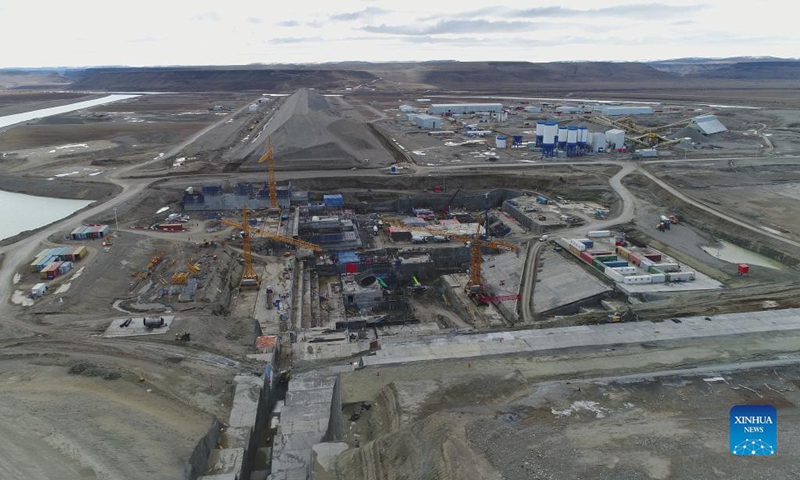
Aerial photo taken on August 26, 2021 shows the Nestor Kirchner-Jorge Cepernic Hydroelectric Power Plant under construction in southern Patagonia, Argentina. Photo: Xinhua
US President Joe Biden announced on Wednesday a proposed new economic partnership with Latin America, claiming the regional vision will "help economies grow from the bottom up and the middle out," the Voice of America (VOA) reported.
The White House unveiled the initiative as the "Americas Partnership for Economic Prosperity," a five-pronged effort to mobilize new investments, fortify supply chains, broaden participation in the formal economy, promote decarbonization, and ensure sustainable and inclusive trade. Based on the information available so far, the framework does not offer increased market access through tariff and non-tariff concessions.
Without including market access commitments, the initiative is unlikely to boost trade flows between the US and Latin America. Under the initiative, the Biden administration is trying to advance transparency and good regulatory practices, pursue high standards on the digital economy, and advance strong labor and environment standards.
The US might hope to attract economies to the initiative with high-standard pledges, in areas ranging from digital economy to labor rights protection, but economies in Latin America could lose interest in the initiative if Biden makes the regional vision a "club of rich countries." With low productivity and poor infrastructure, many countries in Latin America are still struggling to escape what economists label "the middle income trap."
If the initiative cannot provide Latin American countries with practical benefits to scale up investment and boost trade flows, the regional vision will not lead to any concrete results.
An exclusive analysis by Reuters of UN trade data from 2015 to 2021 shows that outside Mexico, US' top trade partner, China, has overtaken the US in Latin America in terms of trade and has widened its advantage since Biden came into office in January 2021.
If US politicians have high hopes for the regional vision to strengthen economic ties with countries in Latin America and to counter China's "growing influence" over the region, they are going to be disappointed.
The US share of global manufacturing activity has declined considerably over the past several decades. The hollowing out of its manufacturing sector and the financialization of the US economy leave little hope to build a US-centric supply chain in the American continent.
It is possible that the US promise to "create resilient supply chains" will turn out to be empty talk and the lack of economic complementarity between the US and Latin American countries may be a barrier for the region to attract foreign investment from the US. This may disappoint countries in Latin America who hope to steal a free ride on US economic development.
As a result, some Latin American countries are looking to China to boost investment and step up trade.
Chinese official data showed on Thursday that Latin America's exports to China continued to expand at a rate of 7.6 percent in the first five months this year, despite the COVID-19 pandemic which weighed heavily on the global economy, underscoring the resilience of economic ties between China and Latin America. China has become one of the most important commercial partners for many Latin American countries and their cooperation cannot be reversed by a summit or vision, like the Americas Partnership for Economic Prosperity.
The biggest problem with the plan is that it is difficult to provide Latin American countries with practical benefits. It seems the initiative is driven more by geopolitical considerations rather than economic factors.
The author is a reporter with the Global Times. bizopinion@globaltimes.com.cn




